Scratch SLAT/s (Upscale) Original Design / Scratch Built
Scratch - SLAT/s (Upscale) {Scratch}
Contributed by Nick Esselman
by EMRR
Two years ago I bought a Seattle Rocket Works SLAT/s and really enjoyed building and flying the rocket. I thought it would be a neat upscale so I set off to do it. My father has an Aerotech Mustang that I gave him to build for NARAM-40 and he donated it to me. Also my Quest Icarus was on its last leg and since I needed that size of body tube, it was retired. These two kits became my "recycled" parts. I added some balsa, and Apogee 10.5mm parts to create my 1.9x upscaled SLAT/s.
What you need to do this:
- Buy a SLAT/s from LawnDart Rocketry for the instructions and guides
- Buy an Aerotech Mustage or 14-1/8" of 1.9" Aerotech Tube, a Nose Cone and the necessary parts for a motor mount
- Buy a Quest Icarus or 12" of 1.378" diameter body tube
- 1/8" Balsa for Fins and Pod center piece (I used 1/8" x 4" x 36" from Ben Franklins)
- 1/4" Balsa for Fin Pods (I used 1/4" x 3" x 36" from Ben Franklins)
- 5 strips (1/8" x 1/2" x 12") of Basswood for RamJet
- 11" of 10.5mm tubing for the RamJet and Dorsal Conduit molding
- 10.5mm Plastic Nose Cone (1-1/2" long) for the RamJet
- 10.5mm Balsa Nose Cone (1-1/4" long) for Dorsal Conduit molding
- Material for Recovery System
- (optional) Parts for electronic's bay
| Conversion of the Mustage Kit: Building the RamJet: Cut each of the (5) vanes of the RamJet from the basswood strips. Following the SLAT/s instructions, cut and sand each vane into the proper shape. Then glue each one onto the 10.5mm body tube making sure the back of the vane is even with the back of the tube. Also each vane edge that attached to the 10.5mm tube should be touching the one next to it. Cut the Icarus body tube to a length of 10-3/4". Once dry, lay this assembly onto the Mustang body tube so that it is hanging off the back. Slide the Icarus body tube over it until it hits the back of the Mustang body tube. Mark where they meet on the Icarus tube. Extend those lines on the Icarus tube and then cut through them lengthwise. Don't use an enlarged guide for these two cuts. You want to make sure that the Icarus tube fits nicely around the vanes and meets with the main body tube. Next, you will need to cut out the front shape of the RamJet using a template. I made my template by going to a copier machine and enlarging the "RamJet Tube Marking Guide" x 1.9x. Then on the front (following the SLAT/s instructions) cut 1.5" lengthwise and 1/4" from the edge to form the front of the RamJet. Mark the Mustang body tube, using an enlarged "Body Tube Marking Guide" and a door jam. Glue the RamJet Vane Assembly and nose cone onto the Mustage body tube using this line as a guide (leave 1/4" from the rear of the rocket). Then glue the Icarus body tube into place on the vanes and the Mustang body tube. Building the Dorsal Conduit: Build the Fin Assembly: Follow the SLAT/s instructions for building the pods. After building the pods, take some sandpaper and attach it to the Mustang body tube. Rub the pods on that sandpaper to form the edge that will be glued to the body tube. Finish assembly of the fins and then glue each one onto the Mustage body tube so that they are touching the edge of the RamJet and so that they are aligned as indicated in the SLAT/s instructions. Finish or . . . . . . Beyond: Prepping the Nose Cone: Building the Electronics Bay: Once the tube is sized and fits right, then a wooden bulkhead will need to be glued onto the top (section that slides into the nose cone). I used a wooden bulk head and a 1.16" thick, 1-1/2" washer on the inside of the tube. I had to use my dremel to size the washer correctly. Drill a hole in the center and mount an large eye-bolt. I used one with a 1" eye, 1/4" thread, and a total length of 2-1/4", along with two hex nuts, one for each size. Don't worry you need the weight. Tie a 40" long elastic shock cord to the eye-bolt on the Electronics Bay and to the Kevlar® coming from inside the nose cone. I used Aerotech's elastic. |
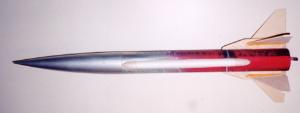  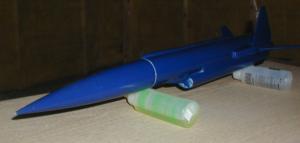 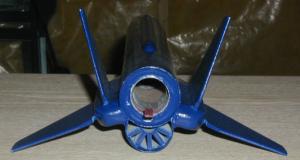 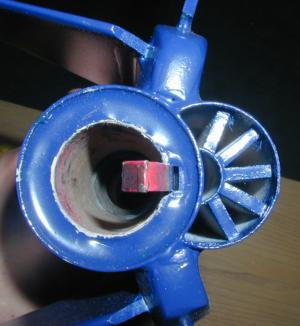 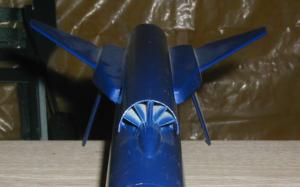 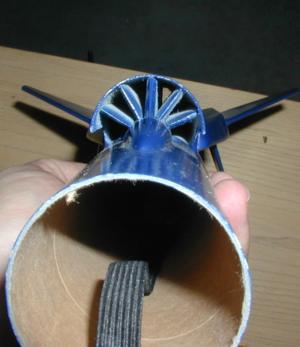 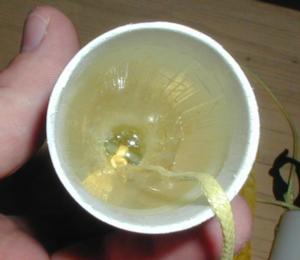 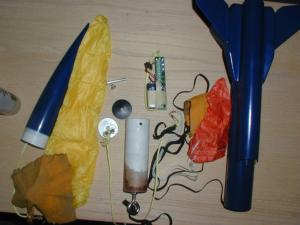 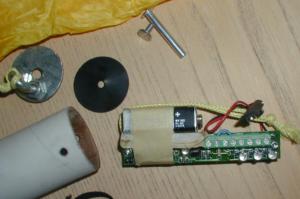 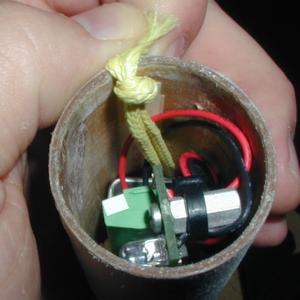 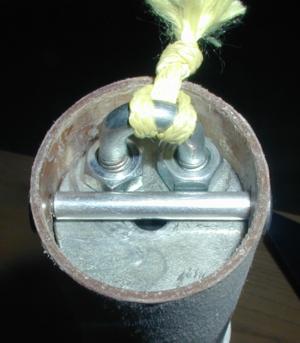 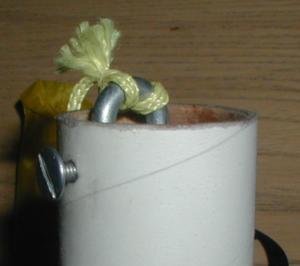 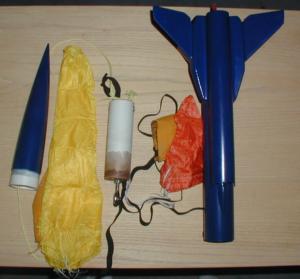 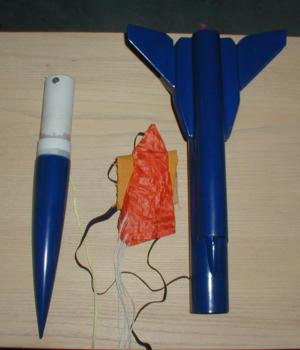 |
For the bottom of the Electronics Bay, I used a rubber washer and a metal washer. I drilled two holes in the metal washer to mount a tie-down to it.
The G-Wiz is the only altimeter that I know of that will fit into this tube. Careful placement of the battery (be sure to tape the battery over so no metal contact is made). Slide the electronics into the bay, place the rubber washer over the top and place the last washer over it. I used a screen door screw across the center to hold it in place.
Attach another 2' piece of 3/16" Kevlar® to other side of the Electronics Bay and then tie it to the elastic shock cord that is attached to the mount of the Mustang kit.
Packing it all in there:
The hardest part is the packing. Use Kevlar®
Heat Shields to protect the parachutes. In the nose cone, place your main
ejection charge all the way toward the tip, then the heat shield, then the
tightly (no choice) wrapped parachute, then the shock cord. Push in the
Electronics Bay to hold it all.
Then place your apogee ejection charge into the rocket body, followed by a Heat Shield and then the parachute.
Building the Electronics Bay:
You could really do a nice finish on this rocket, however, I just hit mine with
some primer and navy blue paint.
Flight:
Well, just like the Seattle Rocket Works (LawnDart) SLAT/s, my upscale doesn't
use a launch lug. A 1/4" rod slides nicely through the RamJet.
From the time I designed it, I had always planned on flying it on EconoJets for several reasons: 1) lower average impulse for a slower lift off, 2) nice black smoke, and 3) loud motor for its class.
Finally, after really being finished for more than 10 months, I got a chance to fly it. I happened to be travelling to Michigan when the 3 Oaks Launch of Michigan Team 1 was scheduled. So off I went . . . yes, even though it was only 28 degrees.
I loaded it with an EconoJet F20 and put her on the 1/4" pad. The first attempt popped the ignitor but did not light the motor. The second time was successful and the upscale SLAT/s came off the pad nicely, stable and straight. It was still traveling upward when the apogee charge fired. It dropped about a hundred feet and the main charge fired. She descended the remainder of the way (pretty fast) and landed with no damage. The altimeter flashed out 512 feet.
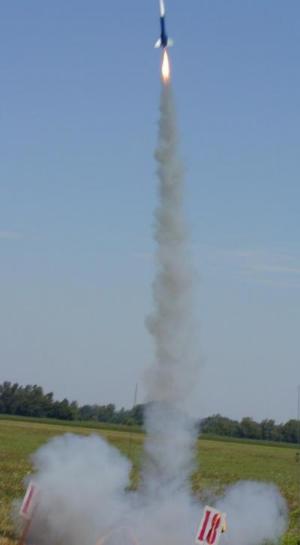 In summary, I am pleased with being able to upscale this nice rocket. It was
every bit as challenging to build as the kit. I am looking forward to flying it
on an EconoJet "G" motor. Also, now that I know she flies well, I'll
probably go back and do a nicer finish.
In summary, I am pleased with being able to upscale this nice rocket. It was
every bit as challenging to build as the kit. I am looking forward to flying it
on an EconoJet "G" motor. Also, now that I know she flies well, I'll
probably go back and do a nicer finish.
NARAM-43 Update
(8/01):
After painting the fins, conduit, and nose cone white the rocket was really
looking nice. It flew twice at NARAM-43 on G35's. The first flight pictured
here, was absolutely perfect. It flew to 1572 feet and the drogue deployed.
Then at 400 feet the main deployed bringing it to a perfect and nearby landing.
This was the most exciting launch for me because it worked flawless and it was
my first 100% flawless altimeter based flight (G-Wiz Altimeter).
The 2nd flight was just as exciting coming off the pad but both 'chutes deployed at apogee (better than none) and with the wind it drifted into the corn field. I spent about 1/2 hour looking then and then went back the next evening and spent an hour but did not find it. Someone has reported seeing it in the lost-and-found box, but I have yet to confirm and get it back. I'm sure I will though.
All-in-all, the rocket has really enhanced by enjoyment of doing an upscale!
Sponsored Ads
 |
 |











